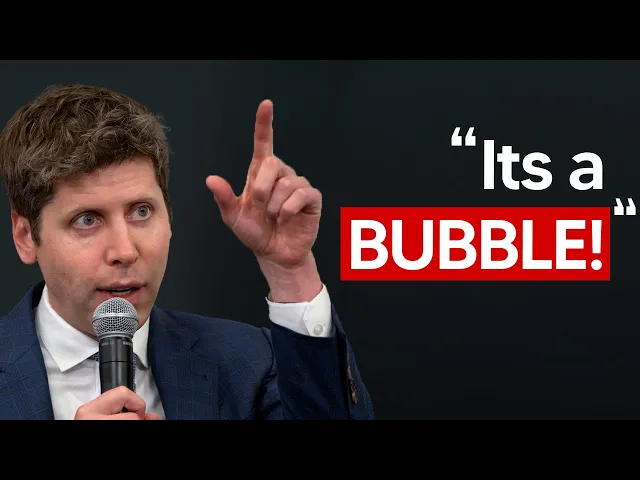AI Community Stunned As Sam Altman Warns Of AI Bubble

Altman's warning: AI bubble could burst
In a world increasingly enamored with artificial intelligence's transformative potential, Sam Altman's recent warning about an "AI bubble" has sent ripples throughout the tech community. The CEO of OpenAI, creator of ChatGPT and arguably one of the most influential voices in artificial intelligence today, has broken ranks with Silicon Valley's characteristic optimism to deliver a sobering reality check about the industry's trajectory. His cautionary stance comes at a pivotal moment when AI investment continues to soar despite growing questions about immediate returns.
Key Points
- Altman believes the AI sector is experiencing a classic economic bubble, with investment enthusiasm potentially outpacing actual technological capabilities in the short term
- While acknowledging AI's extraordinary long-term potential, Altman suggests current expectations for immediate transformation across industries may be unrealistically high
- The OpenAI CEO draws parallels to previous tech bubbles, implying that a correction period could be ahead where valuations realign with demonstrable results
The Bubble Insight: Why It Matters
Altman's warning carries exceptional weight precisely because of who he is – not a skeptic or outsider, but one of AI's most prominent advocates and business leaders. When the person who has arguably done more than anyone to catalyze the current AI boom expresses concern about overvaluation, markets and businesses should take notice.
This perspective matters tremendously within the broader tech landscape, where we've witnessed a massive reallocation of resources toward AI initiatives. Major tech companies have redirected billions in capital expenditure toward AI infrastructure, venture funding has concentrated in AI startups, and enterprises across sectors have initiated ambitious AI transformation projects. The potential bubble has practical implications for business leaders who must now consider whether their AI investments will deliver returns on the timeline they've promised stakeholders.
What makes Altman's warning particularly noteworthy is how it contradicts the narrative that has fueled OpenAI's own meteoric rise. This suggests a level of intellectual honesty about the technology's current limitations that has been largely absent from public discourse.
The Missing Context: AI's History of Boom and Bust
Altman's warning becomes even more significant when placed within AI's historical context, something the video doesn't fully explore. Artificial intelligence has experienced several "winters" following periods of
Recent Videos
How To Earn MONEY With Images (No Bullsh*t)
Smart earnings from your image collection In today's digital economy, passive income streams have become increasingly accessible to creators with various skill sets. A recent YouTube video cuts through the hype to explore legitimate ways photographers, designers, and even casual smartphone users can monetize their image collections. The strategies outlined don't rely on unrealistic promises or complicated schemes—instead, they focus on established marketplaces with proven revenue potential for image creators. Key Points Stock photography platforms like Shutterstock, Adobe Stock, and Getty Images remain viable income sources when you understand their specific requirements and optimize your submissions accordingly. Specialized marketplaces focusing...
Oct 3, 2025New SHAPE SHIFTING AI Robot Is Freaking People Out
Liquid robots will change everything In the quiet labs of Carnegie Mellon University, scientists have created something that feels plucked from science fiction—a magnetic slime robot that can transform between liquid and solid states, slipping through tight spaces before reassembling on the other side. This technology, showcased in a recent YouTube video, represents a significant leap beyond traditional robotics into a realm where machines mimic not just animal movements, but their fundamental physical properties. While the internet might be buzzing with dystopian concerns about "shape-shifting terminators," the reality offers far more promising applications that could revolutionize medicine, rescue operations, and...
Oct 3, 2025How To Do Homeless AI Tiktok Trend (Tiktok Homeless AI Tutorial)
AI homeless trend raises ethical concerns In an era where social media trends evolve faster than we can comprehend them, TikTok's "homeless AI" trend has sparked both creative engagement and serious ethical questions. The trend, which involves using AI to transform ordinary photos into images depicting homelessness, has rapidly gained traction across the platform, with creators eagerly jumping on board to showcase their digital transformations. While the technical process is relatively straightforward, the implications of digitally "becoming homeless" for entertainment deserve careful consideration. The video tutorial provides a step-by-step guide on creating these AI-generated images, explaining how users can transform...
